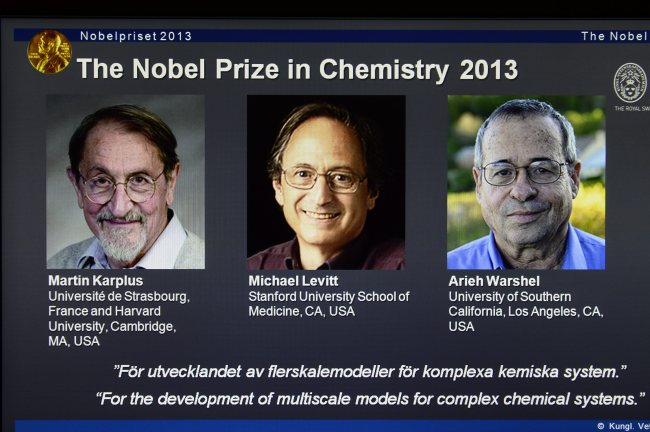STOCKHOLM (AP) -- Martin Karplus, Michael Levitt and Arieh Warshel have won this year's Nobel Prize in chemistry for laying the foundation for computer models used to understand and predict chemical processes.
The Royal Swedish Academy of Sciences on Wednesday said their research in the 1970s has helped scientists develop programs that unveil chemical processes such as the purification of exhaust fumes or the photosynthesis in green leaves.

"The work of Karplus, Levitt and Warshel is ground-breaking in that they managed to make Newton's classical physics work side-by-side with the fundamentally different quantum physics," the academy said. "Previously, chemists had to choose to use either/or."
Karplus, a U.S. and Austrian citizen is affiliated with the University of Strasbourg, France, and Harvard University. Levitt is a British and Israeli citizen and a professor at the Stanford University School of Medicine. Warshel is a U.S. and Israeli citizen affiliated with the University of Southern California in Los Angeles.
Earlier this week, three Americans won the Nobel Prize in medicine for discoveries about how key substances are moved around within cells and the physics award went to British and Belgian scientists whose theories help explain how matter formed after the Big Bang.








![[KH Explains] Hyundai-backed Motional’s struggles deepen as Tesla eyes August robotaxi debut](http://res.heraldm.com/phpwas/restmb_idxmake.php?idx=644&simg=/content/image/2024/05/16/20240516050605_0.jpg&u=20240516155018)









![[Today’s K-pop] NewJeans hits 600m Spotify streams with ‘Ditto’](http://res.heraldm.com/phpwas/restmb_idxmake.php?idx=642&simg=/content/image/2024/05/17/20240517050510_0.jpg&u=)